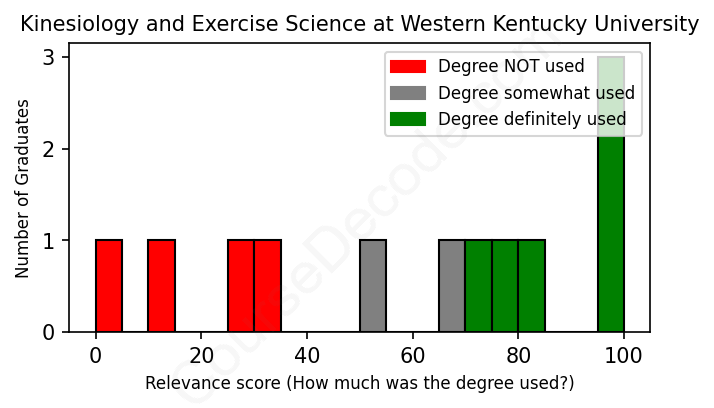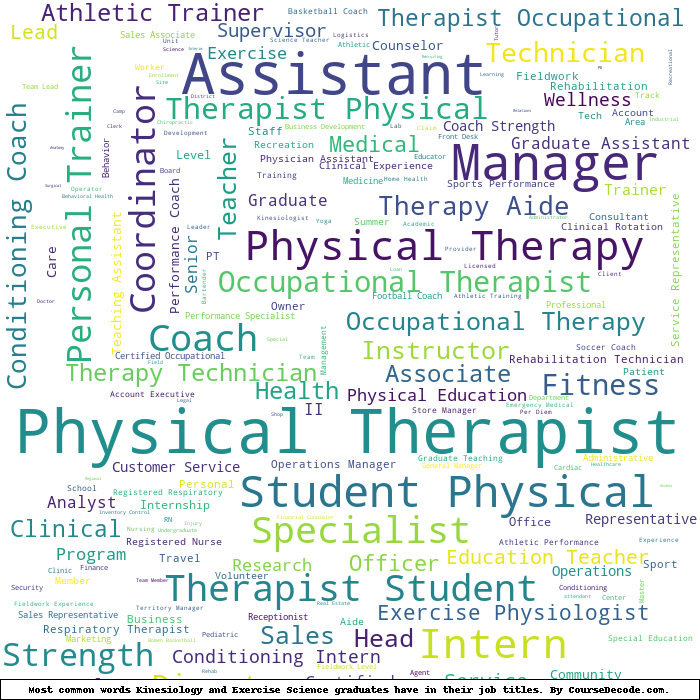
First, some facts. Of the Kinesiology and Exercise Science graduates from Western Kentucky University we've analyzed , here's how many have used (or NOT used) their degree in their career:

These are estimates based on AI analysis of 12 LinkedIn profiles (see below).
The verdict? Below average. Overall, with an average relevance score of 60%, Kinesiology and Exercise Science graduates from Western Kentucky University have a lower likelihood (-7%) of finding work in this field compared to the average graduate across all fields:
And for comparison, here's the chart for all profiles we've looked at across all degrees.
Also, after graduating, 50% of these graduates have pursued further education other than another Bachelor's degree (such as a Masters degree or other), compared to the average across all profiles of 35%. This suggests you may need more than just a Bachelors degree to be competitive as a Kinesiology and Exercise Science graduate.
See the details:
|
Relevance score: 33% We think this person has NOT gone into a career related to their degree. We think this person has NOT gone into a career related to their degree.
DEGREE INFOGraduated in 2017 from Western Kentucky University with a Bachelors Degree in Kinesiology and Exercise Science. Also pursued further education since (see below). JOB HISTORY SINCE GRADUATIONCorporate Manager National Institute for Fitness and Sport NIFS Sep 2021 - Aug 2023 Recreational Therapy Intern  Meaningful Day Services Aug 2023 - Dec 2023 Pharmacy Technician  Meijer Nov 2018 - Present Recreational Therapist  Pure Abilities Therapeutic Services Jan 2024 - Present FURTHER DEGREES DONE SINCE GRADUATINGMaster of Science - MSIndiana University Bloomington 2021 - 2023 ABOUTI hold a B.S. in Exercise Science and a minor in Nutrition from Western Kentucky University. Recent graduate student with an M.S. in Recreational Therapy from Indiana University. |
The top 10 most common jobs done by the graduates we've analyzed (ranked most common to least) are:
After taking a look at the jobs held by graduates from Western Kentucky University's Kinesiology and Exercise Science program, it's clear that many have pursued careers closely tied to their field. A significant portion of these individuals have taken on roles as physical therapists or in similar rehabilitation positions, utilizing their education in Kinesiology to help patients recover and improve their movement. Jobs like Student Physical Therapist and Physical Therapy Technician highlight a strong commitment to applying exercise science principles in real-world scenarios, especially within clinical settings. Nurse Practitioners also make a notable appearance on the list, as they often work with patients to address physical health issues, integrating their knowledge of kinesiology into their care strategies.
On the flip side, there are quite a few graduates who ended up in jobs that don't directly relate to their degree. Positions in sales, management, or other non-health-related fields indicate that not every Kinesiology and Exercise Science graduate stays strictly within the realm of exercise and rehabilitation. For example, roles like Business Development Manager and Assistant Restaurant Manager show a divergence from the core skills associated with their studies. Overall, while many graduates are indeed working in relevant fields that leverage their Kinesiology education, others have veered off into roles that don't fully utilize their specialized knowledge and training. This mix highlights the variety of pathways available, but if you're looking to stick close to your Kinesiology roots, aiming for those rehabilitation and healthcare roles is probably the way to go!
Here is a visual representation of the most common words in job titles for Kinesiology and Exercise Science graduates (this is across all Kinesiology and Exercise Science graduates we've analyzed, not just those who went to Western Kentucky University):

When looking at the career trajectories of graduates from the Kinesiology and Exercise Science program at Western Kentucky University, it seems like there’s a mix of outcomes. For many of the graduates, especially in the earlier years, the first jobs tend to be in physical therapy-related positions or similar health and wellness roles. For instance, those graduating in 2012 and 2014 often started as Student Physical Therapists or nursing roles that aligned well with their studies. This suggests that right after graduation, many are finding jobs that are relevant to their degree, which is a solid start.
However, as we look a bit further down the line—five to ten years after graduation—the picture starts to diverge. While some graduates have successfully built careers in healthcare settings, like physical therapy or nursing, there are quite a few who ended up in roles that seem less directly related to their kinesiology background. For example, graduates have taken jobs in sales or even restaurant management, which indicates that not every career path is a continuation of their initial studies. But it’s worth noting that those who stuck with physical therapy or rehabilitation sectors generally progressed into stable roles, often with impressive titles and responsibilities. So, while some have found their niche in health and fitness, others have had to pivot to find their way professionally. Overall, there's a decent number of successful stories, but there are definitely graduates who have not remained directly aligned with their major, too.
Honestly, a Bachelor’s degree in Kinesiology and Exercise Science can be pretty manageable compared to some other majors, but it still has its challenges. At Western Kentucky University, like at many places, you’ll dive into a lot of science-related courses like anatomy, physiology, and biomechanics, which can get tough if you’re not a fan of memorization or complex concepts. There’s also a fair amount of hands-on work, which can be fun but requires dedication. If you're passionate about fitness, health, and the science behind movement, you’ll likely enjoy it and find the workload to be reasonable. Just be prepared to stay on top of your studies, especially during exam times!
Most commonly, in the LinkedIn profiles we've looked at, it takes people 4 years to finish a Bachelor degree in Kinesiology and Exercise Science.
Looking at these graduates from Western Kentucky University, it's a mixed bag in terms of their earning potential. Some seem to be building solid careers, especially those who advanced into positions like Nurse Practitioners and Physical Therapists, which generally pay pretty well. For example, the 2014 grad who's now at a major hospital likely has a decent salary. However, others have taken paths that may not be as financially rewarding, like those in sales and customer service roles—while they can earn a decent living, they might not match the income of healthcare positions. Overall, if someone sticks with the healthcare field, there’s a good chance they’re doing alright financially, but not everyone is raking it in.
Here is a visual representation of the most common words seen in the "about" section of LinkedIn profiles who have a Bachelor degree in Kinesiology and Exercise Science (this is across all Kinesiology and Exercise Science graduates we've analyzed, not just those who went to Western Kentucky University). This may or may not be useful:

Here are all colleges offering a Bachelor degree in Kinesiology and Exercise Science (ordered by the average relevance score of their Kinesiology and Exercise Science graduates, best to worst) where we have analyzed at least 10 of their graduates: